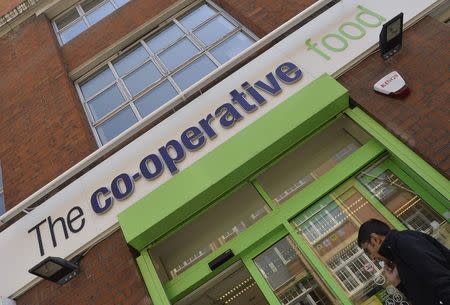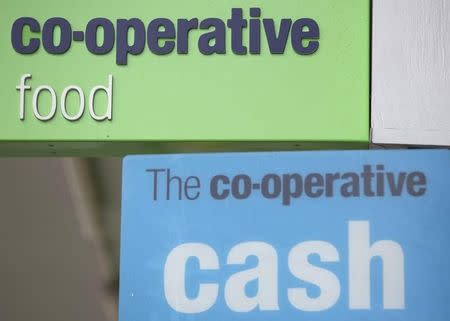Co-operative group unanimously accepts reform proposals
By Paul Sandle MANCHESTER England (Reuters) - Britain's Co-operative Group voted unanimously on Saturday to accept proposals for far-reaching reforms designed to avoid a repeat of the near-catastrophic mistakes of recent years and secure the mutual's future. Independent director Paul Myners drew up the proposals to change the governance of the 150-year-old supermarkets-to-funerals group, which lost control of its bank and slumped to a 2.5 billion pound loss last year. The reforms voted on by delegates at a special general meeting included creating a new board led by an independent chairman, and non-executive directors with commercial experience on a par with the boards of its retail rivals. Group chair Ursula Lidbetter said it was a "hugely significant" moment for the group, which has a 10 billion pound turnover, 90,000 employees and more than 3,000 stores. She told delegates there had been a "catastrophic failure of governance". "Our members have voted unanimously in favour of reform," she told reporters after the vote. The Co-op's problems stem from an ill-fated 2009 takeover of the Britannia building society, which saddled it with a portfolio of risky property loans during the financial crisis. A drugs scandal involving Paul Flowers, the former chairman of its bank, then moved the group's problems from the business pages to the front pages. Lidbetter told the meeting "years of bad business decisions crystallised into one very ugly number at the bottom of our accounts: A 2.5 billion pound loss. "We are at a very fateful point in the history of The Co-operative Group, and indeed the whole of the movement." Myners, a former government minister and City grandee, had said this month "radical decisions on governance needed to be taken very soon" if the Co-op was to be saved. ETHICAL ROOTS As well as reforming the board, which is currently elected from local and regional co-operatives and includes a nurse, a farmer and a retired telecoms engineer, Myners recommended a new membership council to protect its co-operative principles. He also wanted to give all the group's 8 million members a bigger say in its operation under a "one member, one vote" framework, and include provisions in the group's rulebook to protect against de-mutualisation. Some 160 delegates from regional and independent co-operatives voted on the proposals on Saturday. Interim Chief Executive Richard Pennycook said some tough decisions had to be taken, such as selling assets like its pharmacy chain, to return to profitability, an objective that could take five years. Businesses it retained also had to be better run, he said. But the group would keep a presence in all communities in Britain, and it would stick to its ethical roots. "Any surplus we generate, any profits, will go back into the communities where our members live and work, they won't be pulled down to the City of London or Wall Street," he said. As the scale of the its woes became clear, the bank, facing a 1.5 billion pound shortfall, was restructured last year, and as a result, the group lost control of the unit. A multi-million pound write-down on the acquisition of the Somerfield grocery chain in 2009 compounded the problems. The group, based in Manchester, northern England, was also beset by in-fighting on its board, leading to the resignation of its chief executive Euan Sutherland in March. Speaking before the vote, delegate Michael Sheppard said the recommendations made "a lot of sense". "I suspect most people will go along with the vote and will agree with the reform of the main governing board", he said, adding he wanted to see democratic principles maintained in the new structure. Pennycook said once the group's finances were secure, it could start intervening in new markets where stock-market listed companies were not delivering for society. "(We will) get back to what we are all about, which is helping our members and customer where there are market failures," he said. "Whether that's childcare, or energy or healthcare." (Editing by Alison Williams)

 Yahoo Finance
Yahoo Finance 

